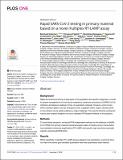Rapid SARS-CoV-2 testing in primary material based on a novel multiplex RT-LAMP assay
Author(s)
Schermer, Bernhard; Fabretti, Francesca; Damagnez, Maximilian; Di Cristanziano, Veronica; Heger, Eva; Arjune, Sita; Tanner, Nathan A.; Imhof, Thomas; Koch, Manuel; Ladha, Alim; Joung, Julia; Gootenberg, Jonathan S; Abudayyeh, Omar O.; Burst, Volker; Zhang, Feng; Klein, Florian; Benzing, Thomas; Müller, Roman-Ulrich; ... Show more Show less
DownloadPublished version (1.225Mb)
Publisher with Creative Commons License
Publisher with Creative Commons License
Creative Commons Attribution
Terms of use
Metadata
Show full item recordAbstract
BACKGROUND: Rapid and extensive testing of large parts of the population and specific subgroups is crucial for proper management of severe acute respiratory syndrome coronavirus 2 (SARS-CoV-2) infections and decision-making in times of a pandemic outbreak. However, point-of-care (POC) testing in places such as emergency units, outpatient clinics, airport security points or the entrance of any public building is a major challenge. The need for thermal cycling and nucleic acid isolation hampers the use of standard PCR-based methods for this purpose. METHODS: To avoid these obstacles, we tested PCR-independent methods for the detection of SARS-CoV-2 RNA from primary material (nasopharyngeal swabs) including reverse transcription loop-mediated isothermal amplification (RT-LAMP) and specific high-sensitivity enzymatic reporter unlocking (SHERLOCK). RESULTS: Whilst specificity of standard RT-LAMP assays appears to be satisfactory, sensitivity does not reach the current gold-standard quantitative real-time polymerase chain reaction (qPCR) assays yet. We describe a novel multiplexed RT-LAMP approach and validate its sensitivity on primary samples. This approach allows for fast and reliable identification of infected individuals. Primer optimization and multiplexing helps to increase sensitivity significantly. In addition, we directly compare and combine our novel RT-LAMP assays with SHERLOCK. CONCLUSION: In summary, this approach reveals one-step multiplexed RT-LAMP assays as a prime-option for the development of easy and cheap POC test kits.
Date issued
2020-11Department
McGovern Institute for Brain Research at MIT; Massachusetts Institute of Technology. Department of Biological Engineering; Massachusetts Institute of Technology. Department of Brain and Cognitive Sciences; Broad Institute of MIT and HarvardJournal
PLOS ONE
Publisher
Public Library of Science (PLoS)
Citation
Schermer, Bernhard et al. "Rapid SARS-CoV-2 testing in primary material based on a novel multiplex RT-LAMP assay." PLOS ONE 15, 11 (November 2020): e0238612. © 2020 Schermer et al.
Version: Final published version
ISSN
1932-6203